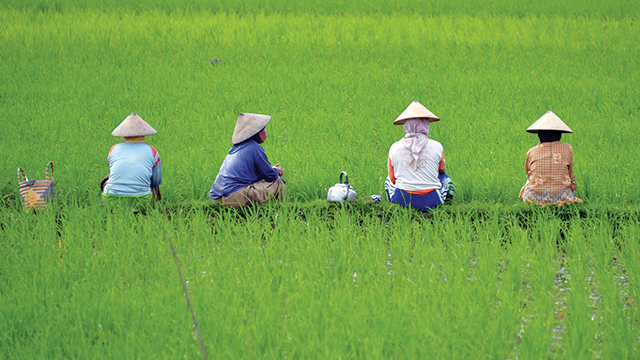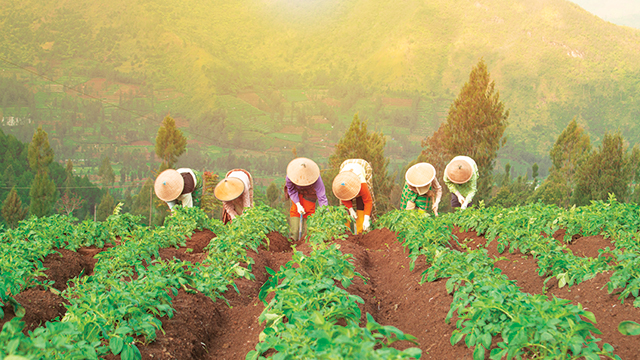Jakarta (Greeners) – Farmers play an important role to ensure food sovereignty. Especially during the Covid-19 pandemic. Considering the disruption of the global food chain, the fulfillment of food in each country maximizes each country’s food potential. Even so, the Indonesian government has not made serious efforts to protect farmers.
The agricultural expert from Institut Pertanian Bogor (IPB), Prof. Dwi Andreas Santosa, conveys his views in the World Food Day webinar No Farmers, No Food, No Future, Friday (16/10/2020). Prof. Santosa states that the government’s protection for farmers is still not visible. This absence is mainly expressed in the government’s reluctance to protect the price of agricultural products. On the other hand, he continues, imported products still compete fiercely with farmers. Prof. Santosa argues that farmers need government intervention in determining the tariff policy for imported products.
“Imports of food products are getting higher. If the government does not implement the tariff policy, the price of imported products when they enter Indonesian soil can be equivalent to products from our farmers,” says Prof. Santosa.
Prof. Santosa then linked the welfare of the farmers with the Job Creation Law. According to him, under the Job Creation Law, the government will be increasingly neglecting farmers’ welfare conditions. The Job Creation Law opens the import tap to maximum, including imports of food products. Prof. Santosa predicts that uncontrolled imports will undoubtedly result in Indonesian farmers’ food products being less competitive.
“Almost all food is imported in Indonesia. The rates are almost all 0 percent or no tariffs. Almost all local commodities will lose. It will destroy our farmers,” says he.
Also read: Job Creation Law Offers Zero Percent Royalty for Mining Companies
Farmers Empowerment Committee Regrets The ‘Minimalist’ Incentives from the Government
Along with Prof. Santoso, who regrets the neglect of farmers’ welfare conditions, the Farmers Empowerment Committee (KPP), Khudori, echoes the same thing. Khudori then mentions his experience as a farmer during the 1998, 2008 crisis and the Covid-19 pandemic. During these crises, he considers farmers to have a role in the domestic economy. Although he continues, there is nothing he can do about the government that overlooked this potential.
Khudori continues to mention some indicators that the government is overlooking farmers’ potentials. Khudori list some indicators such as the shrinking ownership of farmers’ land; farmers’ education that remains low; and farmers’ access to productive resources such as seeds, water, markets, capital, and technology that are not improving.

In a webinar commemorating World Food Day, Khudori, an activist of the Farmers Empowerment Committee voices his opinion about the state that has a large debt to farmers. Photo: Shutterstock.
As a farmer committee, Khudori assesses that state allowances for farmers are very minimal. If there is any, the government allowance never reaches all farmers on Tanah Air. On the other hand, he continues, the government does not guarantee that farmers would benefit from their hard work. Instead of hoping for a helping hand from the state, the farmers must fend for themselves when the price of the harvest falls.
“On the other hand, when farmers just started to enjoy a slight price increase, consumers make a fuss. The defense of the state is always biased towards consumers,” protests Khudori.
Khudori contrasts the condition of farmers in other countries, which he thinks are more prosperous thanks to the state’s presence in ensuring the welfare of farmers. According to him, in other countries, farmers and agriculture are glorified, protected, and not submitted to free-market mechanisms that often kill farmers.
“Here, the state does not reward farmers. The incentives received, including price incentives, are very inadequate. The state has a big debt to farmers who guarantee food,” he explains.
Also read: BMKG: Beware of La Nina Peak in December 2020, January 2021
Indonesian Farmers Need Land to Promote Innovation, Attract Millennials
On the same occasion, farmers from the Association of Climate Change Respondent Farmers (PPTPI), Nurkilah, voices the need for land. According to Nurkilah, to become accomplished farmers, farmers have to innovate a lot in agriculture to improve welfare. Farmers who are also landowners, he continues, get two benefits: they can produce food products and use the land as a medium for innovation.
Nurkilah and other farmers also developed the Field Scientific Stalls (WIL) to create the agricultural sector’s innovations. One of the reasons Nurkilah founded WIL is so that farmers understand agrometeorology or agroecosystems. Understanding agrometeorology or agroecosystems will help farmers’ cope with losses from climate change and the emergence of pests and diseases.
Furthermore, Nurkilah assesses that innovation could attract millennials to enter the agricultural sector. The millennial generation, he continues, can take part in training and production technology to improve the quality of agriculture. Thus, more and more millennials are interested in agriculture.
It can be applied to the younger generation through innovation to be happy with agricultural activities. So it is not monotonous like the activities nowadays,” Nurkilah concludes.
Reporter: Muhammad Ma’ruf
Editor: Ixora Devi



















































